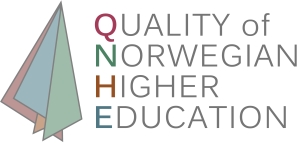Goals
The overall goals of this part are to examine the key systemic/structural and institutional conditions for quality. As these processes go across national, institutional and study program levels, this part of the project employs a multi-level approach for understanding the structural dynamics of the systems that facilitate quality enhancement. This requires sensitivity for the specific social and historical features of Norwegian higher education, including the democratic principles in resource allocation. These issues will be examined through the following research questions:
- Explaining programme development and dynamics: How can we explain the development and expansion of new study programs across Norway, with regard to funding conditions, quality assurance, social changes, shifting demands from labour market and students, as well as the academic development of disciplines?
- Institutional strategies for quality: How does institutional leadership work with quality issues? What strategies and structures are there for quality work at the institutional level? How can we understand NOKUT’s role in quality development? What kind of strategies are there for academic recruitment, career profiles and incentive structures to promote quality? How are students included in quality enhancement processes?
- Local quality enhancement processes: How is quality work conducted in the intersection between administrative and academic logics? Which factors stimulate focus on quality enhancement amongst staff (formal vs informal incentives)?
Empirical approach
The study at this level will use multiple methodological approaches and a combination of both qualitative and quantitative methodology. A survey will be undertaken to assure a representative view on quality work across Norway amongst educational leaders, whereas targeted in-depth case studies will focus on the quality processes at the institutional level where a more multi-level and qualitative approach will be used.
Registry data from DBH will be used as a basis to examine system level dynamics and development of study programs, contextualizing such data with information about funding regulation, quality assurance procedures, and developments in the sector and society. An important consideration here is the structure of the system where the Quality Reform introduced network-based modes of management through devolution of authority to the institutions. This requires a specific focus on understanding the interplay between institutions, state and the agencies. This highlights the need to analyze relevant national policy documents and conduct interviews with key personnel at two national agencies; NOKUT, and SIU Center for Internationalization of Education as important sideways forms of influence. In this the project will be building on the NFR research project “Horizontal governance and learning dynamics in higher education” (HORIZON), coordinated by IPED, where the study of these two agencies is included.
A questionnaire will be sent to a representative sample of educational leaders at all public HE institutions to get insight in their functions and experiences with quality work in practice and their views on current challenges in this area. This will be complemented with data from various NIFU surveys to academic staff that can provide knowledge on quality development taking place in the interface between research and teaching activities and in relation to internationalization. Content analysis of strategic plans of all institutions will be undertaken to map the ambitions and priorities of the Norwegian institutions as regard quality.
Based on the nation-wide survey data, a purposeful sample of institutions will be selected for a more in-depth analysis of the complex interplay between formal and informal structures aimed facilitating quality enhancement. This includes qualitative and quantitative analyses of the documents on issues related to formal requirements for staff recruitment and promotion, in what capacity and how students are involved in quality work, as well as current incentive structures in place that are related to work on quality. Group and personal interviews will be conducted in the selected institutions with academic and administrative leaders; administrators with particular responsibility for quality assurance and internationalization; and students who are included in the quality enhancement processes in a formal capacity. This will allow us to gain insight into good practices as well as tensions and challenges when institutional strategies are put to work at various levels, and the specific considerations made with respect to internal concerns and external requirements, such as those coming from NOKUT. This will also shed light on what actually facilitates quality improvement processes and how working on quality is conducted in the context of potentially competing demands and logics.
Part B staff
Sub-project B is led by Professor Peter Maassen and research professor Agnete Vabø.
Publications
- Tømte, C. E., Fossland, T., Aamodt, P.O. & Degn, L. (2019) “Digitalisation in higher education: mapping institutional approaches for teaching and learning” Quality in higher education, online first publication.
- Stensaker, B., Hovdhaugen, E., Maassen, P. (2019) “The practices of quality management in Norwegian higher education: Collaboration and control in study programme design and delivery“, International Jounral of Educational Management, 33(4), 698-708.
- Stensaker, B., Elken, M., Maassen, P.”Studieprogramledelse – et spørsmål om organisering?“, UNIPED, 42(1).
- Elken, M. & Stensaker, B. (2018) Conceptualising “quality work” in higher education. Quality in Higher Education.
- Stensaker, B., Frølich, N. & Aamodt, P. O. (2018) Policy, Perceptions, and Practice: A Study of Educational Leadership and Their Balancing of Expectations and Interests at Micro-level”, published in Higher Education Policy.
- Stensaker, B. (2017) Academic development as cultural work – Responding to the organizational complexity of modern higher education institutions. International Journal of Academic Development.
- Graversen, E.K.; Lyngs, A. R.; Schmidt, E.K.; Ludvigsen, J.V.; Nielsen, M.L.; and Lauridsen, P.S. (2017) Uddannelsesledelse ved danske videregående uddannelsesinstitutioner. Studielederes rolle i uddannelsernes kvalitetsarbejde. CFA, Aarhus Universitet. Available for download here.
- Fossland, T. og Gabrielsen, H.C. (2017). «Flercampusundervisning» og utdanningsledelse -en balansekunst mellom styring, endring og oversetting i utformingen av et flercampustilbud, I; Torsteinsen, H., Moldenæs, T. og O.J. Andersen (red). Ledelse og skjønnsutøvelse: mellom analyse og intuisjon. Fagbokforlaget
- Stensaker, Bjørn & Maassen, Peter (2016) Enhancing modernization in international quality assurance in higher education: a discussion on available trust-building mechanisms. Journal of Higher Education Policy & Management. Vol. 37, no. 1, pp 30-40
- Solbrekke, Tone Dyrdal & Stensaker, Bjørn (2016) Utdanningsledelse: Stimulering av et felles engasjement for studieprogrammene? UNIPED, Vol. 39, no. 2, pp 144-157
- Aamodt, Per Olaf; Hovdhaugen, Elisabeth; Stensaker, Bjørn, Frølich, Nicoline; Maassen, Peter & Dalseng, Carmen From (2016) Utdanningsledelse. En analyse av ledere av studieprogrammer i høyere utdanning. NIFU arbeidsnotat 2016:10. Available for download here.







